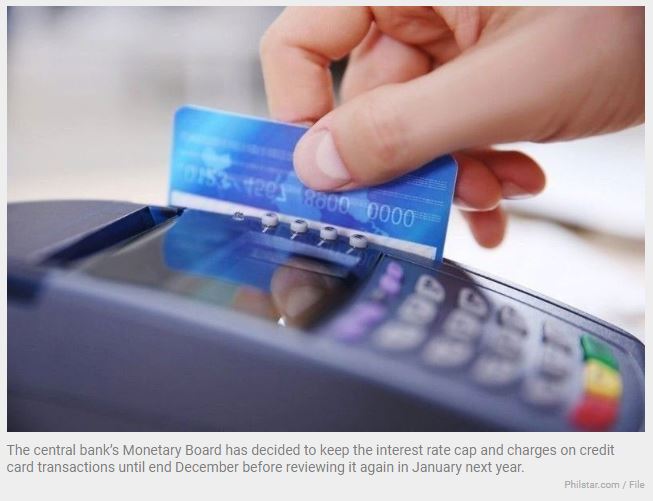Philippines: BSP retains cap on credit card charges until year-end
MANILA, Philippines — Consumers are expected to continue enjoying low interest rates and charges on their credit card transactions at least during the Christmas holidays after the Bangko Sentral ng Pilipinas (BSP) decided to maintain the current cap until the end of the year.
The central bank’s Monetary Board has decided to keep the interest rate cap and charges on credit card transactions until end December before reviewing it again in January next year.
“No big reason. Just the timing of the cap adjustment,” BSP Governor Felipe Medalla told The STAR.
Medalla, who chairs the seven-member Monetary Board, earlier said the regulator is finally adjusting the rate cap and other charges after a series of aggressive rate hikes delivered by the BSP to tame inflation and stabilize the peso.
The STAR first reported that the BSP was imposing a two percent per month and 24 percent per year interest rate or finance charge cap on unpaid credit card balance.
Likewise, the monthly add-on rates that credit card issuers could charge on installment loans was set at a maximum rate of one percent as well as the maximum P200 per transaction processing fee on the availment of credit card cash advances.
The BSP formalized the imposition of the ceiling approved by the Monetary Board through Circular 1098 issued in late September 2020 and the cap took effect on Nov. 3, 2020 to ease the burden of Filipinos affected by the global health crisis.
The maximum rates and fees are subject to review by the BSP every six months and a new rate was supposed to be in place at the start of November.
Prior to the imposition of the cap during the height of the global health crisis, the annualized interest rate on credit card receivables averaged 36 percent.
After slashing key policy rates by 200 basis points that brought the benchmark rate to an all-time low of two percent as part of its COVID-19 response measures in 2020, the BSP has turned hawkish by aggressively raising interest rates by 225 basis points to 4.25 percent this year to tame inflation and stabilize the peso.
The central bank is widely expected to deliver another huge 75-basis point hike on Thursday after Medalla stressed the need for the BSP Monetary Board to match point by point the aggressive rate hikes of the US Federal Reserve to maintain the interest rate differential.
Philippine banks and credit card issuers have reported lower earnings since the ceilings were imposed on credit card charges.
Preliminary data from the BSP showed credit card loans surged by 26.1 percent to P507.42 billion in end September this year from P402.41 billion in end September last year as consumer loans went up by 20.5 percent to P965.99 billion from P801.4 billion.
During the nine-month period, total loans disbursed by big banks grew at a faster rate of 13.4 percent to P10.49 trillion from a year-ago level of P9.25 trillion, supporting the recovery of economic activity and domestic demand.
From the strict Alert Level 3 in January as infections jumped with the highly transmissible Omicron variant, the National Capital Region and nearby provinces shifted to Alert Level 1 staring March as COVID-19 cases steadily dropped.
In the third quarter of the year, the Philippines booked a faster-than-anticipated 7.6 percent gross domestic product (GDP) growth despite soaring inflation and the weak peso. This was slightly higher than the 7.5 percent expansion recorded in the second quarter.
The country is on its way to achieving the 6.5 to 7.5 percent GDP growth target penned by economic managers as the expansion averaged 7.7 percent for the January to September period.
Source: https://www.philstar.com/business/2022/11/13/2223385/bsp-retains-cap-credit-card-charges-until-year-end


 English
English




